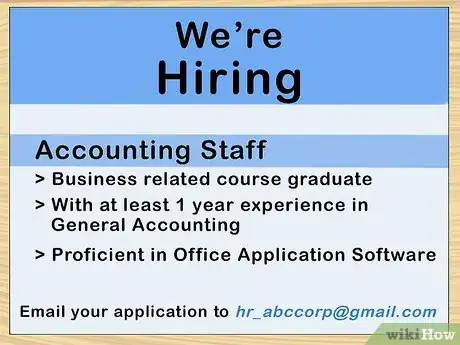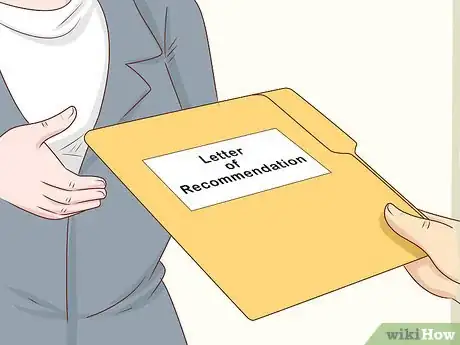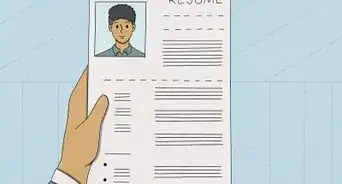This article was co-authored by Michael McCutcheon, PhD. Dr. Michael McCutcheon is a career coach, psychologist, and award-winning public speaker who specializes in procrastination elimination, goal achievement, and increasing life satisfaction. With a background as a counseling psychologist, he guides clients toward becoming more aware of their desires and anxieties to break old patterns, create new habits, and achieve life-changing results. He also helps clients improve organization skills, embark on a new career, get promoted, get admitted into graduate schools, and transition from school to the working world. He is a published author and lecturer in graduate psychology courses at New York University (NYU), a position he has twice won the Teaching Award (2014 & 2019). His work has appeared in the press as a lifestyle and career expert for The Washington Post/The Associated Press, The New York Post, Scholastic, Lifehacker, and The Coca-Cola Company. He has served as a contributing writer for Out Magazine and featured panelist on National Public Radio (NPR).
There are 12 references cited in this article, which can be found at the bottom of the page.
This article has been viewed 70,605 times.
One of the more challenging aspects of managing employees is dealing with an employee’s departure. Having a structured separation policy in place ahead of time will help you know how to accept a resignation letter. Using some basic business management skills, you can learn to appropriately handle an employee's decision to resign from your company in an amicable way.
Steps
Taking Care of Business (Administrative Details)
-
1Develop a logical system for handling resignation letters. You will appear unprofessional if you do not have a clear, concise way of dealing with outgoing employees.
- Want to make the transition out of your company go as smoothly as possible?
- Create generic separation information packets to outline what happens next.
- These can include severance packages, leave notice requirements, provision of a forwarding address for final pay, and final dates of employment.
-
2Determine when counteroffers will be made. Each resignation is different and involves varying factual scenarios. As an employer, you have to determine when counteroffers are acceptable and when you will simply let the employee go. Some employers have a policy of never trying to retain an employee that seemingly doesn't want to be there. However, a policy that allows for some negotiation may be advantageous, particularly when the employee is valuable to your team.
- For example, if the individual resigning is a high ranking officer or executive, you may want to understand their concerns and try to correct them so the employee stays.
Advertisement -
3Draft a reply letter. Included in your standard resignation acceptance system should be a reply letter. The letter should state that you regret the loss of the employee, but respect and understand their decision. Inform them of the date you received the letter and date of their final workday. Be cordial and wish your outgoing employee the best.
- Acknowledge you received the letter: “Dear [employee name], I regretfully received your resignation notice on [date resignation notice was submitted].
- State their final work date: "Your resignation has been approved and your final work day will be [date of final work day]."
- Wish your employee well: "It's been a pleasure working with you, and on behalf of the entire company, I wish you good luck in your future endeavors."
- Tell them where to direct questions: "Please direct any questions to this office."
- Close with thanks: "Thank you for your many years of service. Sincerely, [your name].”
-
4Protect confidential business information. If your company has given an individual access to company credit cards, bank accounts, automobiles, or laptops or other electronic equipment, ensure that these are returned. After they depart, eliminate the employee’s access to the office via security cards and change system logon info.[1] Protecting your company and its property should be at the top of your priority list when considering how to accept a resignation letter.
- If employees are required to sign a non-compete agreement as part of the hiring process, review this document with the employee at the time you accept their resignation.
- This will ensure they are fully aware of their limitations in releasing company information and contacting clients or associates of the company.
-
5Wrap things up. If the resigning employee is in the middle of a project or deal, get them to finish it. If it is impossible for them to complete their current workload before they depart, get them to draft a report outlining what has been done and what has been left undone. Let them know what is expected of them before they leave the company.
- Instruct the employee to provide a list of important email addresses, phone numbers, and computer files for their replacement.
- Request that the employee provide a forwarding address for their tax statements and final paycheck.
-
6Establish an end date. Usually, human resources guidelines mandate that the employee provide at least two weeks’ notice before resigning. At the end of the two weeks, the employee is free to leave. Based on what you know of the employee’s current workload, you may or may not request to extend that deadline.[2] End dates may vary with the employee’s position within the company; individuals with more responsibilities will typically have to wait longer before officially leaving the company than junior rank-and-file employees.
- Different states have different laws regarding notice. For example, in Kansas, an employee does not need to provide any notice when he or she quits.
- Some states may require advance notice. Be sure you check your local laws to ensure the established end date is valid.
-
7Work on hiring a replacement. The path toward replacing the employee who is leaving with another employee should begin immediately. Search your firm’s roster for an acceptable candidate. Ask the outgoing employee for suggestions as to who they think would be a good fit for the position. If no qualified employees exist within your company, open the hiring process to external candidates. Locating and training the outgoing employee’s replacement in a swift and timely manner will ensure that workflow interruption is minimized.
- If you can hire the departing employee’s replacement before they leave, allow them to train under the outgoing employee. This will guarantee a smooth transition.
-
8Conduct an exit interview. An exit interview gives the departing employee a chance to talk about their experience with you and express what they felt worked in their specific department or in the business at large.[3] Encourage your departing employee to be honest in their evaluation of the company, his coworkers, and management during the exit interview. Listen carefully and use their insights as an opportunity to learn how you can best identify their replacement and adjust the expectations for the person assuming the position.[4]
- Find out more about why the employee wants to leave when you conduct the exit interview.
- Understanding the employee's motivations lets you delve deeper into what you could do to convince them to stay. It can also help you identify things you may want to change about your business to retain employees in the future.[5]
Making a Counteroffer
-
1Decide if you want to accept the employee’s resignation. Bargaining with an employee to stay is usually a good idea if you can afford it, especially if they have many years with the company, lots of institutional knowledge, and valuable contacts who may follow him or her to their new position.[6]
-
2Find out as much as you can about the employee’s reasons for leaving the company. Use this explanation to decide if the employee can be bargained with. If your employee is leaving because they hate their job, don’t try to keep them around. However, if they are leaving to pursue a better job – with more freedom, better pay, or more prestige – you might consider talking them out of it by making a counteroffer.[7]
-
3Don’t delay the inevitable. Often, a counteroffer to retain an employee will not keep them at your firm in the long run. There may be reasons beyond the ones they admitted to which make them want to leave your firm. This is not to say that your employee is lying, but they may actually believe that their current position is worth keeping for money alone. Typically, employees are not leaving solely due to the size of their paycheck.[8] Keeping them around is a temporary solution best avoided.[9]
-
4Consider the message you’re sending. If other employees get wind of the fact that you made a counteroffer to your resigning employee in order to get them to stay, the others may see you as desperate to keep people from jumping ship. Furthermore, they may feel that they should be looking at other work opportunities as well, and threaten to leave in order to get a raise or promotion.[10]
-
5Do not pressure the employee to stay. If their mind is made up, you will gain nothing by leaning on them to stay. Do not disparage or raise doubts about the quality of the firm your outgoing employee is joining. If the employee is less sure of his or her decision to resign, making them feel stupid, guilty, or selfish by quitting is not only unprofessional and manipulative, but is not in your best interests. This underhanded behavior is unbecoming of a leader.
- Pressuring the employee to stay is bad for both them and you.
- Without solving the underlying reasons for the employee’s dissatisfaction, you create a recipe for later disappointment when they decide to leave.
-
6Be honest. Do not promise a resigning employee new responsibilities or a change in the office culture if you can’t deliver on it. Such mendacity will needlessly embitter your outgoing employee, and leave them with a bad taste in their mouth when they finally realize nothing will change.
- Even if you’re well-intentioned, step back and ask what changes are possible and what's not possible in your workplace.
- For instance, if your employee wants a job already filled by someone else, be honest and let the employee know that you can't give them what they want.
Saying Goodbye and Showing Appreciation
-
1Maintain your composure. Handle the resignation professionally.[11] This is especially important when you are handed the resignation letter in person and are receiving the first notice of the employee’s leaving. Do not react emotionally. If you respond negatively, the employee may become offended and lash out at you or their coworkers.
- A sour employee can make the few weeks they remain at the company a nightmare.
- Responding with sadness, shock, or grief, while understandable, could make the situation even more stressful and difficult for the resigning employee.
- Do not add to the employee’s stress and discomfort by asking them to stay (unless you offer an improved salary and benefits as well).
-
2Offer the employee a letter of recommendation. These should accurately describe what the employee’s responsibilities were. Work with them if they desire specifics in their letter about the work they did for your firm, but be honest and sincere. Keep your letters of recommendation brief and to the point. If the company receiving the letter has questions, they will contact you.[12]
- Begin a standard letter of rec with a salutation (“dear so-and-so”).
- Include a description of how you know the resigning individual and describe your experience working with them.
- Include a litany of qualities which make the employee attractive to you and, presumably, to another employer.
- Add concrete examples to back up your praise. For instance, if you say someone is creative, cite 3-4 instances of their creative problem-solving.
- Declare that the employee will continue to excel in their chosen profession.
-
3Let the gang know. Send out a memo or email to the resigning employee’s coworkers announcing the resignation. Let them know regretfully that the employee in question is leaving, and on behalf of the company you wish them well in their future endeavors.
- Directly announce the employee is leaving: “It is with deep regret that I must inform you that [employee’s name] will be moving to another position."
- Clarify the employee's last day: "Their last day will be [employee’s last day]."
- Publicly wish the employee well: "Please join me in wishing him/her well in all future endeavors.”
-
4Celebrate the employee’s decision. Even though you are disappointed to see a good worker (and maybe even a good friend) leave, it is important that they know their work and contributions were valued. Throw a work party at the end of their last day to let them know. If you don’t want to take office time away from everyone, arrange for everyone to meet for drinks after the end of the employee’s last work day. If you think a more intimate send-off is appropriate, have a small team lunch on the employee’s last day.[13]
-
5Leave the door open.[14] Extend the opportunity to the employee to return if they find their new employer doesn’t work out. Let them know they will always have a home at your business.
- When outgoing employees feel their work was appreciated and they were valued, they will act as goodwill ambassadors for your firm.
- They might recommend your company to other potential employees and partner businesses or agencies.[15]
- The connections your employee gains in his or her next position could benefit you as well.
Expert Q&A
-
QuestionCan you reject a resignation letter?
 Michael McCutcheon, PhDDr. Michael McCutcheon is a career coach, psychologist, and award-winning public speaker who specializes in procrastination elimination, goal achievement, and increasing life satisfaction. With a background as a counseling psychologist, he guides clients toward becoming more aware of their desires and anxieties to break old patterns, create new habits, and achieve life-changing results. He also helps clients improve organization skills, embark on a new career, get promoted, get admitted into graduate schools, and transition from school to the working world. He is a published author and lecturer in graduate psychology courses at New York University (NYU), a position he has twice won the Teaching Award (2014 & 2019). His work has appeared in the press as a lifestyle and career expert for The Washington Post/The Associated Press, The New York Post, Scholastic, Lifehacker, and The Coca-Cola Company. He has served as a contributing writer for Out Magazine and featured panelist on National Public Radio (NPR).
Michael McCutcheon, PhDDr. Michael McCutcheon is a career coach, psychologist, and award-winning public speaker who specializes in procrastination elimination, goal achievement, and increasing life satisfaction. With a background as a counseling psychologist, he guides clients toward becoming more aware of their desires and anxieties to break old patterns, create new habits, and achieve life-changing results. He also helps clients improve organization skills, embark on a new career, get promoted, get admitted into graduate schools, and transition from school to the working world. He is a published author and lecturer in graduate psychology courses at New York University (NYU), a position he has twice won the Teaching Award (2014 & 2019). His work has appeared in the press as a lifestyle and career expert for The Washington Post/The Associated Press, The New York Post, Scholastic, Lifehacker, and The Coca-Cola Company. He has served as a contributing writer for Out Magazine and featured panelist on National Public Radio (NPR).
Career Coach & Psychologist Unless they're under a contract or something, typically no. You can definitely try to retain the employee by asking what would get them to stay, though!
Unless they're under a contract or something, typically no. You can definitely try to retain the employee by asking what would get them to stay, though! -
QuestionWhat's the point of an exit interview?
 Michael McCutcheon, PhDDr. Michael McCutcheon is a career coach, psychologist, and award-winning public speaker who specializes in procrastination elimination, goal achievement, and increasing life satisfaction. With a background as a counseling psychologist, he guides clients toward becoming more aware of their desires and anxieties to break old patterns, create new habits, and achieve life-changing results. He also helps clients improve organization skills, embark on a new career, get promoted, get admitted into graduate schools, and transition from school to the working world. He is a published author and lecturer in graduate psychology courses at New York University (NYU), a position he has twice won the Teaching Award (2014 & 2019). His work has appeared in the press as a lifestyle and career expert for The Washington Post/The Associated Press, The New York Post, Scholastic, Lifehacker, and The Coca-Cola Company. He has served as a contributing writer for Out Magazine and featured panelist on National Public Radio (NPR).
Michael McCutcheon, PhDDr. Michael McCutcheon is a career coach, psychologist, and award-winning public speaker who specializes in procrastination elimination, goal achievement, and increasing life satisfaction. With a background as a counseling psychologist, he guides clients toward becoming more aware of their desires and anxieties to break old patterns, create new habits, and achieve life-changing results. He also helps clients improve organization skills, embark on a new career, get promoted, get admitted into graduate schools, and transition from school to the working world. He is a published author and lecturer in graduate psychology courses at New York University (NYU), a position he has twice won the Teaching Award (2014 & 2019). His work has appeared in the press as a lifestyle and career expert for The Washington Post/The Associated Press, The New York Post, Scholastic, Lifehacker, and The Coca-Cola Company. He has served as a contributing writer for Out Magazine and featured panelist on National Public Radio (NPR).
Career Coach & Psychologist It helps you plan for the future. By discussing the employee's experience at your business, you should gather some insights about how to improve things. You want your employees to be as happy and productive as possible, and an exit interview should help there. Also, leaving on a upbeat note by showing the leaving employee respect when they're on the way out will give them a positive impression of the job for years to come. This can pay off in the future as you build a reputation for treating your people right.
It helps you plan for the future. By discussing the employee's experience at your business, you should gather some insights about how to improve things. You want your employees to be as happy and productive as possible, and an exit interview should help there. Also, leaving on a upbeat note by showing the leaving employee respect when they're on the way out will give them a positive impression of the job for years to come. This can pay off in the future as you build a reputation for treating your people right.
Warnings
- Burning bridges is never a good idea, especially when dealing with an employee who has played a critical role in the success of your company.⧼thumbs_response⧽
- Every state has different laws about employment relationships. Make sure you understand and comply with all state and local laws where you work.⧼thumbs_response⧽
References
- ↑ http://www.hrworks.co.za/policies?pid=61&sid=302:Resignation-Procedure
- ↑ https://hbr.org/2015/03/when-an-employee-quits-and-you-didnt-see-it-coming
- ↑ http://www.inc.com/susan-salgado/making-your-goodbyes-as-warm-as-your-welcome.html
- ↑ Michael McCutcheon, PhD. Career Coach & Psychologist. Expert Interview. 24 February 2021.
- ↑ Michael McCutcheon, PhD. Career Coach & Psychologist. Expert Interview. 24 February 2021.
- ↑ http://www.careercast.com/career-news/pros-and-cons-counteroffers
- ↑ http://www.careercast.com/career-news/pros-and-cons-counteroffers
- ↑ http://www.inc.com/suzanne-lucas/should-i-make-a-counter-offer.html
- ↑ https://books.google.com/books?id=tF_D7j5ZLX4C&lpg=PA161&dq=how%20to%20make%20a%20counter%20offer%20to%20resigning%20employee&pg=PA161#v=onepage&q&f=false
- ↑ https://books.google.com/books?id=tF_D7j5ZLX4C&lpg=PA161&dq=how%20to%20make%20a%20counter%20offer%20to%20resigning%20employee&pg=PA161#v=onepage&q&f=false
- ↑ http://www.inc.com/susan-salgado/you-re-leaving-how-to-react-when-employees-resign.html
- ↑ Management Communication, 429, https://books.google.com/books?id=m3_VGosl-3QC&lpg=PA426&dq=resignation%20letter&pg=PA429#v=onepage&q&f=false
- ↑ http://www.inc.com/susan-salgado/you-re-leaving-how-to-react-when-employees-resign.html
- ↑ https://books.google.com/books?id=wzVjCwAAQBAJ&lpg=PT37&ots=7PQEIq3zO2&dq=management%20saying%20goodbye%20to%20resigning%20employee&pg=PT37#v=onepage&q&f=false
- ↑ http://www.inc.com/susan-salgado/making-your-goodbyes-as-warm-as-your-welcome.html
- ↑ https://www.gov.uk/handling-staff-resignations

































-Status-Step-6.webp)












































